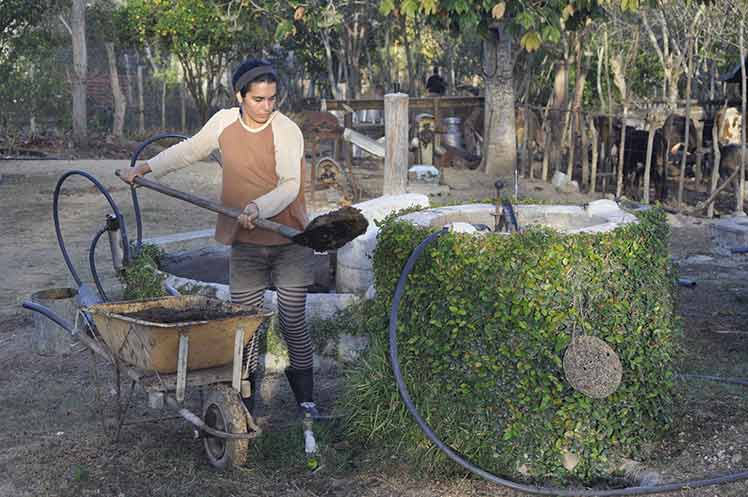Havana, Cuba: The transformation in Cuba of a degraded rural landscape, into an agro-ecological farm articulated with development projects through the application of good practices and technological solutions, is a dream come true today in the Island, Prensa Latina publishes.
La Finca del Medio was a family desire, to create a different way of life without depending on many things to live, to be able to produce our own food, a 20-year path not without difficulties, Leydis Casimiro, one of its members, explained.
When we moved to that settlement in 1993, she commented, one of the most pressing problems was the shortage of workforce, since the family -currently with 11 members- at that time was made up of four people, two of them minors, Casimiro being the oldest and was only 12 years old.
That need, she said, raised the innovative and innate capacity of José Antonio Casimiro -father of the interviewee-, who designed a team for animal traction that replaces the work of 66 men in the field work and has the capacity to perform 28 tasks different farms.
This established a space to study and execute other empirical practices as a way to avoid losing more land on the farm; it is in this environment that the transformation process began.
It was 2005 when the Farmer to Farmer movement captured the members of La Finca del Medio as agro-ecological promoters, but they currently belong to other spaces such as Permaculture in Cuba, SlowFood International, the Biomas Cuba project, as well as several academic, national and international institutions, he listed.
Today, Finca del Medio stands out for the novelty of the tools it implements, including the hydraulic ram, the construction of barriers to protect the soil, the establishment of living fences, crop rotation and fallow areas.
To these are added the practices of production and use of natural fertilizers, reforestation with fruit trees, innovations in bio-digesters, gravity irrigation mechanisms, bio-constructions and more, she continued.
An element of interest is the use of different renewable sources such as solar, wind and the bio-digesters themselves, this allows the farm to supply itself with 95 percent of energy and free itself from the use of fossil fuels, which for the first time they enjoyed at seven years of living in the place, he recalled.
Along with the development of the farm, Casimiro studied at the university. Graduated in Economics and Law, in both modalities she linked her personal experiences to research; but her studies go further, and he also holds the categories of Doctor in Agricultural Sciences in Cuba and Doctor in Agro-ecology awarded by a university in Colombia.
From 2001 to approximately 2018, she explained, Finca del Medio hosted a wide variety of events, congresses and trainings; however it is in that last year that they decided to incorporate rural tourism.
The idea was to add this modality as a complementary activity to generate income, from lodging and food and, in addition, radiate their knowledge, principles, values ??and ethics to other contexts.
Furthermore, the essence of Finca del Medio underlies the initiative The idea of ??on the table, very well defined by José Antonio Casimiro.
“It is the root of a life model where the family farm can boast the glory of leading to the maximum as a culture, the simplification of a set of small details that make the title of small farmers great,” he specified.
?They can show the natural conception of food at the table, from the selection of the seed to its tasting. The idea on the table exposes new agricultural thinking that can be seen, smelled, touched and tasted like in an art gallery,? he added.

